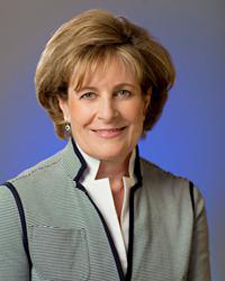
Women In Energy: Merribel Ayres
The Women in Energy series is a joint project between USEA and USAID that was developed out of USEA’s Engendering Utilities Partnership, a program funded by USAID to improve gender policies and gender outcomes at their respective organizations.

Every month we feature a woman who has shown exemplary leadership and showcase her story. The women among you come from diverse backgrounds and roles and bring a unique perspective to gender equality within the energy sector.
Merribel Ayres, Principal of Lighthouse Consulting Group, has been a leader in the Washington business and political communities for three decades. Founded in 1996, Lighthouse celebrates 23 years in 2019. The firm’s concentration is on energy and environmental business/policy strategies which advance and achieve client goals.
Ms. Ayres has been a central player in the energy transition—with both utilities and their industrial & commercial customers. Her in-depth background with leading energy businesses (their investors and stakeholders) enables her to provide a critical perspective for Clients and Boards, both as an Adviser and Director.
Her experience is comprehensive within the energy sector and related technologies (e.g. natural gas, coal, oil, nuclear, renewables, electric grid modernization). She is recognized for her expertise in Climate/Carbon and related Energy System strategies. She has a track record in brokering agreements and partnerships among stakeholders (business, government & NGO). In addition to Lighthouse’s political advocacy services, Ms. Ayres provides high-level advisory and strategic management services to CEOs and senior leadership teams.
*Neither USEA nor USAID alters the substance of the responses from the women featured. The answers are their own.
Women in Energy Interview Questions
1. How have your education and career path led you to where you are now? In most unusual ways! My undergraduate background was in English and Irish Literature, French and Philosophy. Yet, people often ask me if I am lawyer—probably because of strong analytic and communications skills! I started my career as a journalist which helped sharpen my writing abilities—an important asset throughout my career. Over time, I was able to take advantage of focused executive programs and seminars at several top institutions, including the Wharton School of Business, the Harvard Kennedy School and Harvard Business School. I started my firm, Lighthouse Consulting Group, 23 years ago after heading a power industry trade group which relied on outside lawyers, lobbyist and PR firms. I realized that the energy sector needed/needs advisors who understand the business, know the relevant policymakers and stakeholders, can help shape strategy and communicate effectively.
2. Over the course of your career, have you witnessed changes in the sector that have launched more women into leadership positions? The big game-changer in my view is that more women are preparing for careers in engineering, business, law, finance and computer science. If you look at the women CEO’s in the electric sector, you will invariably find academic and professional credentials such as these.
3. Technology is transforming the traditional utility business model into a more modern interactive grid. Some utilities view this transformation as an opportunity to focus on change management and diversity. Research provides compelling evidence that inclusion and diversity unlock innovation and drives better business performance. What, if anything, is your organization doing to attract, retain, and promote more women into senior management positions to respond to the dramatic industry transformation? While my own firm is intentionally small, I often serve in a C-Suite advisory role with large companies and am able to counsel clients on the importance of having of diversity in the leadership team. But I also stress that diversity of experience, perspective and outlook is as important as diversity in gender, ethnicity and race. Among my CEO client base, it has been gratifying to see heightened awareness in focused recruiting of women on Boards and in executive positions.
4. Are talented women within your organization making it to top leadership positions? Why/why not? I had the pleasure on serving as a Director for CMS Energy in Michigan for several years and watched a new 2011 recruit from a neighboring utility—with a background in Industrial Engineering and Management—quickly demonstrate her abilities in a variety of operational roles throughout the company. Five years later, in 2016, Patricia (Patti) Poppe was named Chief Executive and has moved CMS Energy into the forefront of the utility industry for innovation and strategy, particularly in serving large customer clean energy requirements.
5. Companies that embrace diversity outperform their competitors. What type of diversity programs does your organization have in place to mentor future women leaders? How does your organization measure and report gender diversity? Is the data publicly available? (NOT APPLICABLE)
6. What actions should the energy and electricity sector be focused on to accelerate change, increase diversity, and foster a better gender balance in the boardroom? As a consultant, I have been privileged to work with many leading companies and organizations over the years and have refined my own “8-Points of Good-to-Great Cultures:”
1) Avoid silos and siloed thinking,
2) Work across the boundaries in teams,
3) Stress performance and accountability,
4) Know your own (and your organization’s) blind spots,
5) Validate your assumptions with internal and external stakeholders,
6) Stay grounded in the truth of the situation,
7) Speak plainly, and
8) Take pride in humility (me last vs. me first).
Companies whose DNA incorporates these principles tend to cultivate a diverse work force and do well in both driving and adapting to change!

